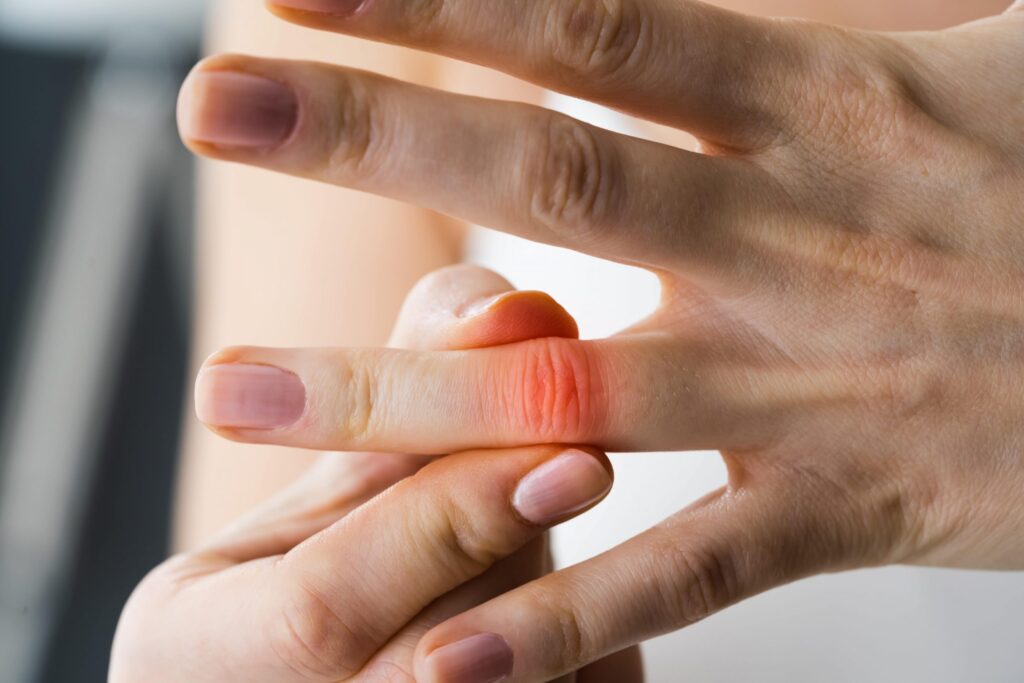Trigger Finger / Trigger Thumb
When a Finger Gets Stuck or Locks in Place
Trigger finger (or trigger thumb) happens when the tendons in the finger become inflamed and no longer glide smoothly. This can cause the finger to lock, click, or feel stuck when you try to straighten it.
Why Trigger Finger Develops
Each finger has tendons that move like ropes through a tunnel in the hand. When the tendon becomes swollen or thickened, it struggles to pass through this tunnel, leading to a catching or locking sensation.
Common Causes and Risk Factors
Trigger finger is more likely to occur if you:
- Perform repetitive gripping or grasping tasks
- Have medical conditions such as diabetes or rheumatoid arthritis
- Experience tendon irritation after injury
- Are between ages 40–60 (more common in this group)
- Have a history of carpal tunnel syndrome or other hand conditions
Symptoms That Point to Trigger Finger
Typical signs include:
- A finger or thumb that locks when bent, then suddenly “snaps” straight
- Clicking or popping when moving the finger
- Stiffness, especially in the morning
- Tenderness at the base of the finger or thumb
- Pain when gripping objects
How Doctors Diagnose Trigger Finger
Diagnosis is usually straightforward and based on:
- Physical examination: checking for locking, clicking, and tenderness
- Medical history: reviewing daily activities, past conditions, or injuries
- Imaging: not always required, but ultrasound may be used in some cases
Treatment Options for Trigger Finger
Most cases improve with non-surgical care, but treatment depends on severity:
- Lifestyle changes: avoiding repetitive gripping when possible
- Splinting: resting the finger to reduce irritation
- Medications: anti-inflammatory drugs to relieve pain and swelling
- Injections: corticosteroids to shrink swelling in the tendon tunnel
- Surgery: tendon release procedure considered if symptoms are persistent or severe
Living with Trigger Finger
Trigger finger can be frustrating, from struggling with buttons to holding objects. Early treatment often brings relief and prevents the finger from stiffening permanently. If locking or pain keeps recurring, medical advice can help determine the next step.
Frequently Asked Questions (FAQ)
1. Is trigger finger caused by arthritis?
Not directly. Arthritis may increase risk by irritating tendons, but trigger finger itself is due to tendon inflammation and narrowing of the tunnel.
2. Can trigger finger go away without treatment?
Mild cases sometimes improve with rest and splinting. Persistent locking usually requires medical treatment.
3. Are injections safe for treating trigger finger?
Steroid injections are commonly used and often effective, but may not work in all cases. Your doctor will recommend if it’s suitable for you.
4. How long does recovery take after surgery?
Recovery is usually quick, with most people regaining normal movement within weeks. Some soreness or stiffness may last for a short period.
5. Can trigger finger come back after treatment?
Yes, it can recur, though treatment (especially surgery) significantly reduces the risk.
Book a Consultation for Finger or Thumb Locking
If you notice your finger or thumb catching, clicking, or locking, book an appointment at Mash Spine & Orthopaedics for an assessment and treatment options.





